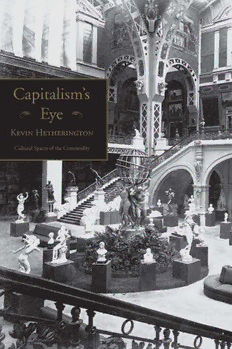Table Of ContentCapitalism’s
Eye
(cid:2) (cid:3)
Other titles in the Cultural Spaces series, edited by Sharon Zukin
After the World Trade Center: Building the Next New York
Edited by Michael Sorkin and Sharon Zukin
Buyways: Billboards, Automobiles, and the American Landscape
By Catherine Gudis
Silicon Alley: The Rise and Fall of a New Media District
By Michael Indergaard
Forthcoming titles in the series:
Branding New York: Image Crisis and the Rise of the Neoliberal City
By Miriam Greenberg
The Global Architect
By Donald McNeill
Foodies: Culture and Status in the American Foodscape
By Josée Johnston and Shyon Baumann
Chinatowns
By Gregor Benton
Capitalism’s
Eye
(cid:2) (cid:3)
Kevin Hetherington
Cultural Spaces of the Commodity
New York London
Published in 2007.
Reprinted by permission of the publisher from THE ARCADES PROJECT by Walter Benjamin, translated
by Howard Eiland and Kevin McLaughlin, pp. 7, 9, 10,13,14,19,20,25,26,212,405,406,407,409,415,463,669.
Cambridge, MA: The Belknap Press of Harvard University Press, Copyright (c)1999 by the President and
Fellows of Harvard College. Originally published as Das Passagen-Werk, edited by Rolf Teidman, Copy-
right (c)1982 by Suhrkamp Verlag.
Routledge Routledge
Taylor & Francis Group Taylor & Francis Group
711 Third Avenue 2 Park Square
New York, NY 10017 Milton Park, Abingdon
Oxon OX14 4RN
© 2008 by Taylor & Francis Group, LLC
Routledge is an imprint of Taylor & Francis Group, an Informa business
International Standard Book Number-13: 978-0-415-93341-4 (Softcover) 978-0-415-93340-7 (Hardcover)
No part of this book may be reprinted, reproduced, transmitted, or utilized in any form by any electronic,
mechanical, or other means, now known or hereafter invented, including photocopying, microfilming,
and recording, or in any information storage or retrieval system, without written permission from the
publishers.
Trademark Notice: Product or corporate names may be trademarks or registered trademarks, and are
used only for identification and explanation without intent to infringe.
Library of Congress Cataloging-in-Publication Data
Hetherington, Kevin.
Capitalism’s eye : cultural spaces of the commodity / Kevin Hetherington.
p. cm. -- (Cultural spaces)
ISBN 978-0-415-93341-4 (pbk.) -- ISBN 978-0-415-93340-7 (cloth)
1. Consumption (Economics)--United States--History. 2. Consumption
(Economics)--Europe--History. 3. Consumer behavior--United States. 4. Consumer
behavior--Europe. 5. Senses and sensation. I. Title.
HC110.C6H48 2007
330.12’2--dc22 2006102735
Visit the Taylor & Francis Web site at
http://www.taylorandfrancis.com
and the Routledge Web site at
http://www.routledge.com
For Linda
This page intentionally left blank
Contents
Preface and Acknowledgments ix
Chapter One
Relations of Production under Glass 1
Chapter Two
Consumption and Spectacle 25
Chapter Three
Phantasmagoria and the Fetish 51
Chapter Four
Memories of Capitalism 73
Chapter Five
The Distracted Flâneuse 103
Chapter Six
At Home in the World 131
Chapter Seven
Disposal and the Display Case 157
Afterword: Taking Possession 181
Notes 185
Bibliography 197
Index 213
vii
This page intentionally left blank
Preface and Acknowledgments
In some ways this is a book about ghosts and graveyards, even if not explicitly so. The
question of haunting and its relationship to social theory as an issue has interested me
since I first read Jacques Derrida’s Spectres of Marx (1994). Doubly so after reading
Avery Gordon’s Ghostly Matters (1997) and its very helpful attempt to frame the issue
of haunting in sociological rather than philosophical or psychoanalytic terms. I was
particularly interested in two things that came out of Derrida’s work: we should not
think we have ever disposed of the past fully and we have to find some way of accom-
modating it in the present. He was, of course, referring to Marx, who I admit I thought
I had disposed of, and through him, his deconstruction of the term phantasmagoria. I
knew this word from Marx but had mainly associated it with Walter Benjamin’s work
since first reading Susan Buck-Morss’s “reconstruction” of his Arcades Project (1989)
when it first appeared. And this approach opened up a line of thinking for me around
issues of consumer culture that I had been investigating.
I read this work by Derrida alongside Michel Serres’s Rome (1991) in which I
found a similar concern with the multiplicity and folding of time and knowledge.
In addition to his concern with mingling human and nonhuman agents, and his
emphasis on the importance of developing a philosophy of the object, Serres is keen
to challenge linear and simple conceptions of the development of knowledge in
time. Rather, he suggests, knowledge is folded, multiple, overlapping, and complex
in composition. He wants to develop a topological approach to how knowledge is
made and of keeping the issue of multiplicity in play rather than trying to simplify
it (see also Law 2004).
For Serres, as for Derrida, all this has implications for how we think about the
ideas and the theories that have come before. For both, issues of debt and acknowl-
edgement are to the fore. This seems in contrast to the dominant “avant-gardism”
that seems to have developed in recent times in social science where there seems to
be a need to rush headlong into finding new theories or new objects of inquiry and
to simply rubbish the past and approaches found there as outmoded, unfashionable,
or plain wrong. In this the past is disposed of as some form of rubbish. But it is
precisely that that leaves one open to the spectre of the past and its revenant forms:
ix

